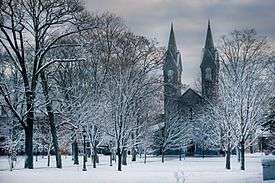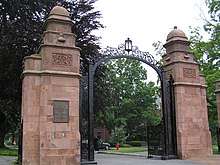Christopher Pyle
Christopher H. Pyle (born 1939) is a journalist and Professor of Politics at Mount Holyoke College in South Hadley, Massachusetts. He testified to Congress about the use of military intelligence against civilians, worked for the Senate Judiciary Subcommittee on Constitutional Rights, as well as the Senate Committee on Government Oversight. He is the author of several books and Congressional reports on military intelligence and constitutional rights, and has testified numerous times before the U.S. Congress on issues of deportation and extradition.[1][2]
Professor Emeritus Christopher H. Pyle | |
|---|---|
| Born | 1939 |
| Nationality | American |
| Occupation | Professor of politics |
| Known for | 1970 congressional testimony on Army intelligence surveillance on US soil |
| Awards | Polk Award et al. |
| Academic background | |
| Education | Bowdoin College |
| Alma mater | Columbia University |
| Website | https://www.mtholyoke.edu/people/christopher-pyle |
Background

Pyle graduated from Bowdoin College, and earned an MA, LLB, and PhD at Columbia University.[1]
Career
Government Service
.pdf.jpg)
In the 1960s, Pyle served in the United States Army as a captain in Army Intelligence Command (now United States Army Intelligence and Security Command).[1]
In the 1960s while an Army captain in intelligence, Pyle learned that "Army intelligence had 1,500 plainclothes agents watching every demonstration of 20 people or more throughout the United States," (as later Pyle recounted on December 19, 2005, on Democracy Now[3] and again on ABC News on January 6, 2006,[4]) as part of a broad-based program of domestic spying. In January 1970 he disclosed the Army's spying. Senator Sam Ervin investigated the Army's spying as chair of the Judiciary Subcommittee on Constitutional Rights, and Pyle worked as an analyst for his committee, testifying to Congress about his own findings. Ervin continued to investigate government activities; together with the Church Committee inquiries, these Congressional studies led to the drafting of the Foreign Intelligence Surveillance Act. Pyle served as a consultant for three Congressional committees in this area. (Later in the 1970s Ervin served as chair of the Congressional committee that conducted hearings on the Watergate scandal.)[1]
In the 1970s and 1980s, Pyle continued to serve Congress in the Office of Technology Assessment and as a constitutional expert before Senate and House Judiciary committees and the Senate Committee on Foreign Relations.[1]
Academics

Pyle first joined Mount Holyoke College in the 1970s. He has taught constitutional law and civil liberties, chaired Mount Holyoke’s programs in American Studies and Complex Organizations and the Department of Politics (2011-2012).[1]
Pyle has taught politics to intelligence agents in the army; to policemen at the John Jay College of Criminal Justice; undergraduates at University College, Dublin; law students at Harvard University, and graduate students at Universidad Complutense de Madrid.[1]
Private life
Pyle is a member of the board of directors of the ACLU of Massachusetts.[1]
In 2004, Plye was elected chair of the Petra Foundation, a national organization that recognizes and assists “unsung heroes” who make extraordinary contributions to social justice.[1]
Awards and recognition
Awards:
- 1970: Hillman Prize for investigative journalism[1][2]
- 1971: Polk Award for investigative journalism[1][2]
- 2002: "Outstanding Academic Title," Choice, for Extradition, Politics and Human Rights (2001)
- 2004: Luther Knight Mcnair Award from ACLU Massachusetts for contributions as “teacher, scholar, and model citizen activist”[1]
- 2007: Distinguished teaching award from Mt. Holyoke[1]
Fellowships and Grants: Pyle has received the following[1]:
- Russell Sage Foundation
- Mellon Foundation
- National Endowment for the Humanities
- Institute for the Study of World Politics
- Aspen Institute
- Fulbright Program
Works
Books: Pyle has written several books on military surveillance, extradition, and issues related to the use of torture in intelligence gathering in the US war on terror, including:
- The President, Congress and the Constitution with Richard Pious (1984) ISBN 0-02-925380-2
- Military Surveillance of Civilian Politics, 1967-1970 (American legal and constitutional history) (1986) ISBN 0-8240-8290-7
- Extradition, Politics, and Human Rights (2001) ISBN 1-56639-823-1
- Getting Away with Torture: Secret Government, War Crimes, and the Rule of Law (Potomac Books Inc. (2009) ISBN 1-59797-387-4; ISBN 978-1-59797-387-8
- The Constitution under Siege with Richard Pious (2010)
Articles: Pyle has written for hundreds of newspapers, includingg the New York Times, Washington Post, Wall Street Journal, and Los Angeles Times, as well as magazines and journals including The Nation, Washington Monthly, Civil Liberties Review, Foreign Policy, American Political Science Review, Political Science Quarterly, and Boston University Law Review:
References
- "Christopher H. Pyle". Mount Holyoke College. Retrieved 7 August 2020.
- "Mount Holyoke Prof Attends "War Crimes" Conference". Mount Holyoke College. Retrieved 7 August 2020.
- "An Impeachable Offense? Bush Admits Authorizing NSA to Eavesdrop on Americans Without Court Approval". Democracy Now. 19 December 2005. Retrieved 7 August 2020.
- "No Place to Hide". ABC News. 6 January 2006. Retrieved 7 August 2020.
External links
- Christopher H. Pyle, Professor of Politics, Mount Holyoke
- Public Information Research, Names Base (Archive)
- Protecting Our Civil Liberties: The Core of Democracy, July 25–26, 2003 conference
- Christopher Pyle, "Military Spying of Olympia Peace Activists", video by Democracy Now!